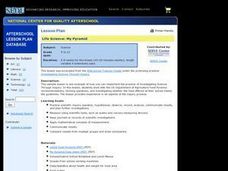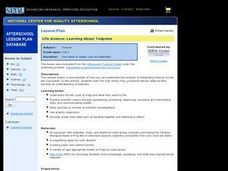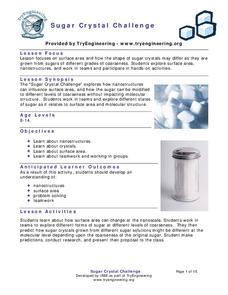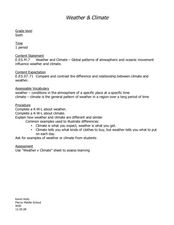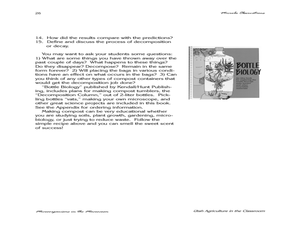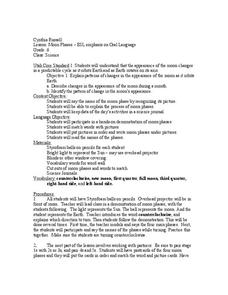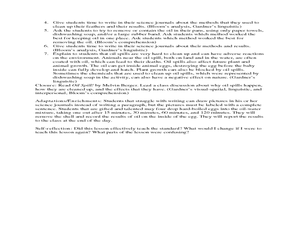Curated OER
Life Science: My Pyramid
Students examine how the school food program compares to the food pyramid recommendations. In this food pyramid lesson, students compile data regarding the food choices available in the school through the lunch program and vending...
Curated OER
Life Science- Learning About Tadpoles
Students investigate a frog's life cycle. In this tadpole lesson plan, students observe tadpoles in an aquarium and record results. Students fill in a KWL chart as an assessment.
TryEngineering
Sugar Crystal Challenge
Be sure to use this sweet resource. Scholars perform an experiment using sugar to investigate how surface area relates to the coarseness of sugar. They consider how this concept connects to nanotechnology.
American Chemical Society
All Wet
Sometimes liquids just don't get along together. A fun experiment has scholars determine whether various liquids dissolve in water. They pour isopropyl alcohol, vegetable oil, and corn syrup into cups of water to see which ones mix well...
Curated OER
Growing a Seed
Seeing how seeds grow into plants is such an enjoyable for students! They plant lima bean seeds and take pictures to record the growth of their plants. Students write in a journal to describe their daily observations of their plants, and...
Curated OER
The Water Cycle: States of Water
Elementary schoolers explore states of matter by concentrating on the ways in which water moves between its solid, liquid, and gaseous states in a variety of Earth environments. Learners interpret these movements through dance. The...
Curated OER
How Does Your Garden Grow?
Learners discover gardening by documenting plants grown on school grounds. In this botany lesson plan, students utilize digital cameras to capture images of plants on photo hikes which are turned into a slide show. Learners plant a...
Curated OER
Can You Get A Charge Out Of Matter?
Students observe and demonstrate how objects can be charged positively and negatively and how static electricity works. They observe a teacher-led demonstration, and in small groups rotate through various static electricity activities,...
Curated OER
Plant Propagation
Students successfully start a new plant by any means of vegetative propagation. They select a propagation method which is appropriate for the plant and keep a laboratory journal of the treatment and progress of the new plant.
Curated OER
What Plants Need
Students plant seeds in milk cartons, over the next two weeks, they watch the plants closely to see how they grow and change. They keep a photo journal to record the growth of the plant.
Curated OER
Big on Blubber: How do Whales Stay Warm?
Students explore biology by conducting a science experiment in class. In this whale anatomy lesson, students identify the use of whale blubber for the animal to stay warm in cold waters while utilizing ice, vegetable oil, plastic bags...
Curated OER
Mini-Ecosystems
Third graders identify the living and non living things in a book read aloud and discuss the interactions represented in the book. Then, they research and include a list of food that each animal needs in an ecosystem. Finally, 3rd...
Curated OER
Weather/Climate
Students examine traditional Native American weather/climate knowledge. They keep a weather journal and research cloud cover.
Curated OER
What is an Earthworm Like?
Second graders study earthworms. In this science lesson, 2nd graders observe an earthworm using a magnifying lens, draw pictures of the earthworm, and record their observations.
Curated OER
Rotten Truth
Students complete activities to study decomposition. In this decomposition lesson, students work in pairs to observe a decay buffet experiment. Students keep compost bag journals. Students define and discuss the process of decomposition.
Chicago Botanic Garden
Personal Choices and the Planet
The last activity in the series of four has individuals determine steps they can take to reduce their carbon footprints and then analyze their schools' recycling programs. Through a sustainability audit, they identify how and where their...
Foundation for Water & Energy Education
How Can Work Be Done with Water Power? Activity C
Third in a set of lessons regarding reservoirs, dams, and hydropower, this involves a two-day hydropower plant simulation. Collaborative groups build, maintain, and finance the plant. The transparency of the reservoir setup can be...
Chicago Botanic Garden
Climate and Forest Ecosystem Services
Forests, through sequestration, capture excess carbon dioxide in our atmosphere and store it, aiding in climate change. The third installment in a four-part series on how climate impacts forests explores carbon sequestration. Classes...
Curated OER
Weather Journal
Sixth graders write in a journal using weather observations as the focus, they develop writing techniques in addition to scientific observation skills.
Curated OER
Garden Journals
Students create "Garden Journals" using construction paper, poster board, and general art supplies in this Art, Science, Reading, and Writing lesson for the early-elementary classroom. This activity may be done at the beginning of the...
Curated OER
Exploring the Galapagos
Students explore the species found in the Galapagos Islands and practice descriptive writing skills by creating a sample journal. They create a fictional journal that documents the places they visit and the species they encounter.
Curated OER
Moon Phases
Sixth graders investigate the phases of the moon. In this moon phase lesson plan, 6th graders discover that the moon changes in a cycle as it orbits Earth. Students label pictures of moon phases and keep a moon phase journal. Students...
Curated OER
Dino-Mite Web Quest
In this science instructional activity, students identify a specific dinosaur to research. Then they develop an overview of their dinosaur family and the foods each dinosaur in their family eat. Students also identify how the dinosaurs...
Curated OER
Cleaning an Oil Spill
Third graders use oil, feathers, eggs, rubber bands, and more to create a simulated oil spill and then clean it up. In this oil spill lesson plan, 3rd graders discuss what their cleaning process is like and how the oceans are effected...


